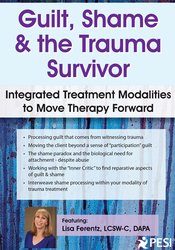

Guilt is about what somebody has done. Shame is about who somebody is. Clients with sexual and physical abuse have two problems: who they are, and what they have done. Wouldn’t most people feel hopeless at that point? Wouldn’t most clinicians feel overwhelmed?
Resolving these two pervasive, paralyzing issues absolutely moves therapy forward but requires a host of psychotherapeutic interventions.
Watch Lisa Ferentz in this recording to learn cognitive, emotional, somatic, expressive, and psychoeducational techniques all used at key moments in therapy to have the fullest impact on resolving these pivotal issues. As a trauma therapist, author, and international presenter, Lisa Ferentz has spent 35 years working with the deepest levels of shame and guilt, honing integrated practices specific to the client’s readiness to address these intense emotions.
Case examples are woven in throughout the day to help you learn how guilt and shame surround unmetabolized traumatic experiences, including sexual abuse, and the profound and confusing dynamic of pleasure that occurs in many instances for male and female victims. The recording will include crafting psychoeducation with practical cognitive techniques, self-compassion, and even expressive modalities – in addition to experiential activities to help you create a treatment plan adapted to your specific clients and trauma treatment modality.
This online program is worth 6.25 hours CPD.
| File type | File name | Number of pages | |
|---|---|---|---|
| Manual - Guilt, Shame & The Trauma Survivor (1.27 MB) | 34 Pages | Available after Purchase |

Lisa Ferentz, LCSW-C, DAPA, is a recognized expert in the strengths-based, de-pathologized treatment of trauma and has been in private practice for over 35 years. She presents workshops and keynote addresses nationally and internationally, and is a clinical consultant to practitioners and mental health agencies in the United States, Canada, the UK, and Ireland.
She has been an adjunct faculty member at several universities, and is the founder of “The Ferentz Institute,” now in its 12th year of providing continuing education to mental health professionals and graduating over 1,600 clinicians from her two certificate programs in Advanced Trauma Treatment.
In 2009, she was voted the “Social Worker of Year” by the Maryland Society for Clinical Social Work. Lisa is the author of Treating Self-Destructive Behaviors in Trauma Survivors: A Clinician’s Guide, 2nd Edition (Routledge, 2014), Letting Go of Self-Destructive Behaviors: A Workbook of Hope and Healing (Routledge, 2014), and Finding Your Ruby Slippers: Transformative Life Lessons From the Therapist’s Couch (PESI, 2017). Lisa also hosted a weekly radio talk show, writes blogs and articles for websites on self-harm and self-care, and teaches on many webinars.
Speaker Disclosures:
Guilt, Shame and Common Client Misconceptions
Psychoeducation: Navigating Guilt
Shame: The Root of Who I Am
Treatment Planning: Techniques from Internal Family Systems (Schwartz)
Cognitive and Emotional Antidotes to Shame in the Clinical Setting
Integrating Creative Modalities to Process Guilt & Shame
| 5 |
|
| 4 |
|
| 3 |
|
| 2 |
|
| 1 |
|
Satisfaction Guarantee
Your satisfaction is our goal and our guarantee. Concerns should be addressed to info@pesi.co.uk or call 01235847393.
Please wait ...